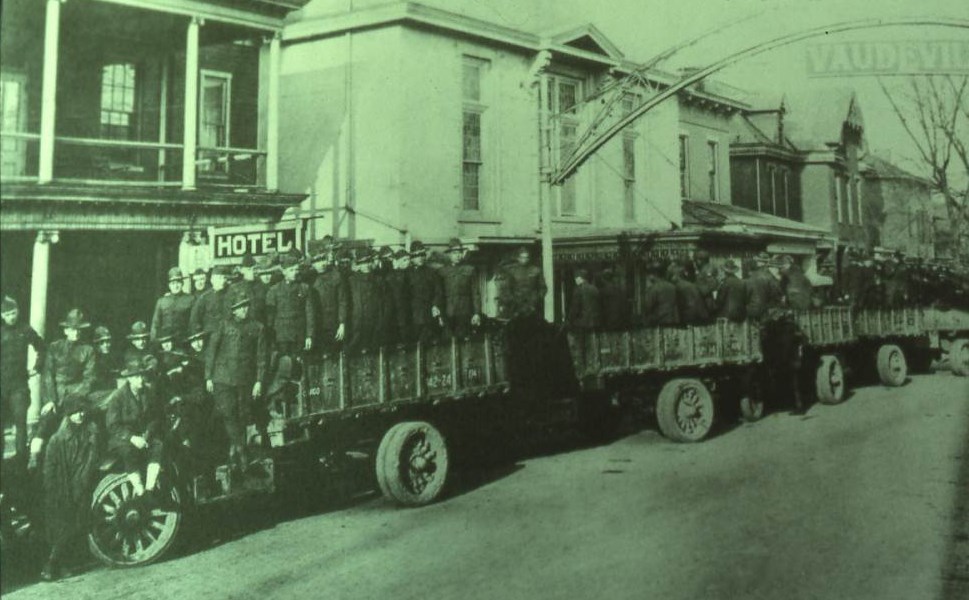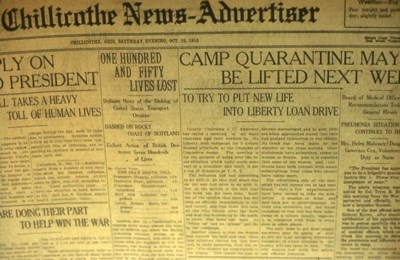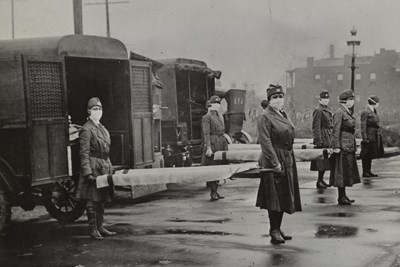 [Gertie apparently had a friendship with a Mr Emil Quanetrom, 10418ave.H. East Side Sta., Chicago Ill., 36 years old, possibly beginning when she was traveling to Cuba. She wants to correspond but Elinor has to write the letters because Gertie is too ill. Gertie is barely able to take a few steps in the house. Elinor is taking treatments from Dr. Easton but complaining that her “liver is so bad” and she complains of hip pain. Pa gets his upper teeth removed, and dentures.
[Gertie apparently had a friendship with a Mr Emil Quanetrom, 10418ave.H. East Side Sta., Chicago Ill., 36 years old, possibly beginning when she was traveling to Cuba. She wants to correspond but Elinor has to write the letters because Gertie is too ill. Gertie is barely able to take a few steps in the house. Elinor is taking treatments from Dr. Easton but complaining that her “liver is so bad” and she complains of hip pain. Pa gets his upper teeth removed, and dentures.
Elinor talks about making popped corn (no explanation of how it was done). She talks about Elbert and Audrey trying out the new ship yard restaurant with dancing and eating.
Nellie is keeping in touch with her husband John McKinley Harnish who is fighting in the war. At one point she and Pa take a train to Cleveland, then a train to Columbus and then a car to Camp Sherman (Chillicothe Ohio) where John is stationed and which was suffering from the epidemic. John McKinley Harnish returns from the war on December 15, 1918
Elinor is corresponding with Dan but chastises his name for not visiting her He shows up November 25, 1918. She again uses code language about what Dan gave her. It was deciphered by Sara Klips and her husband Ryan Thomas: “Dan bought me a box of writing paper a bottle of ink & 12 stamps & a box of chocalates a bag of nuts & a bag of oranges & apples and a newspaper every day.” Its very unclear why she would want that to be in code. Dan leaves by the second of December for Erie Pennsylvania.
The first Germany surrender brought whistles and parades and shouting but in fact it was based on a false report. and the celebration was repeated.
Almost as big as the epidemic and the war is the fact that Elinor arranges to get a “new 1900 Washing machine & Wringer” She exclaims that for 17 years she has had to wring the clothes by hand. She has to pay 6.75 in installments. She is selling eggs from 26 hens & a rooster. She receives a gift of a fountain pen which may be what she used for the rest of the diary.
Elbert is trapping and hunting including a big mink the size of a cat and a smaller one and 3 skunks & 40 muskrats for hides.
The family friend Glenn Haught got a gift for Martha, a big soldier doll, when Pa and Elinor went to Cleveland to visit by “car” that was crowded, standing room only for the whole trip home (2.5 hours).
Elinor is reporting more contact with the church including at the Epworth League which is a young adult Methodist association for 18-35 year olds which started in Cleveland in 1889.]

Nov.1. Gertie’s fever 99 1/5 Nellie got her telegram. & don’t have to go, John is going to be there for a while yet. Pa finished the washing & Nellie helped him. I feel alive
Nov.2. Gertie’s fever 97 1/5 I am going to bed its 1-30 a.m. I don’t feel very well myself.
Nov.3. Gertie is normal today I swept & moped the dining room & aired our bedding today.
Nov.4. Took care of Gertie cooked & done house work & sewed a little today.
Nov.6. Gertie doing well sit up today about 5 minutes. I did a days work this afternoon.
Nov.7. Germany surrendered today, they blew all the whistles played the band had a parade & shouted & yelled from 20 minutes two 2 p.m. until long after 12 p.m. I thank God with all my soul.
Nov.8. Well the report was not true & so they’ll have to do all the soise over. Made Gertie terrible nervous but she doing fine
Nov.5. Got things straightened up a little more today. Ruby’s baby came today 8lbs& 10 ozs.a girl. both doing well. Nellie don’t feel well.
Nov.9. Audrey came home early & we did quite a lot of work. but I’m so tired.
Sun.Nov.10. It fine day but I feel an unrest Well, John phoned for Nellie to come and she & pa left in time to catch the 8-50 limited for Cleveland, they expect to get the midnight train out for Columbus & then to take a care to Camp Sherman.
The Spanish Influenza Pandemic of 1918 at Camp Sherman
Hopewell Culture National Historical Park

NPS Photo

NPS Photo
While the allies battled an enemy in the fields and trenches of Europe in 1918, the entire world would have to engage and fight a seemingly invisible enemy that wasn’t isolated to war combatants on the field of battle. The Spanish Influenza Pandemic of 1918 would tally a greater mortality rate than that of all who were killed during combat in WWI. No one is quite sure where exactly the Influenza originated, but once it began to spread there was no hiding from this silent and deadly disease. Over 20 million people, almost 5% of the world population, died as this disease spread with ruthless efficiency. 43,000 U.S. soldiers, around half of those who died in Europe during the war, were killed by the influenza virus and not by a mortal enemy in combat. In the U.S. alone, over a quarter of the population would become infected and nearly 700,000 would die as a result of the disease. Conditions around the globe would mimic that of the Black Death Bubonic Plague in the 14th century. However, this strain of influenza would kill more people in one year than what the Bubonic Plague did in four total years.

Library of Congress
A Global Killer comes Home
In Chillicothe and at Camp Sherman, the disease spread just as quickly as it did everywhere else. Thousands of residents and soldiers were infected in a very short time. Approximately 5,686 cases of influenza were documented among Camp Sherman soldiers in 1918. 1,777 of them were unable to ward off the disease and died. Statewide in Ohio, hundreds of thousands of people became infected and tens of thousands died. During one week alone in the fall of 1918, 1,541 people were confirmed to have died throughout the state.
With the high mortality rate at Camp Sherman, The Majestic Theater on 2nd Street in Chillicothe became a temporary morgue. Bodies would be “stacked like cordwood” at the theater while it was operated as a morgue. Body fluids that were drained during the embalming process ran off into the alley next to the theater giving it the dubious nickname of “Blood Alley.” Once victims’ bodies completed the embalming process, they would be transported by wagon back to the camp so they could be sent back to their hometowns by railway. As these wagons made their way through Chillicothe, funeral hymns were played to reflect the somber mood. As with all public places in the U.S., meeting places, bars and theaters were closed to try to prevent further spread of the disease. All personnel at Camp Sherman were quarantined from Chillicothe as well.
By summer of 1919, the pandemic would come to an end as the influenza ran its course and the world’s population built up an immunity towards it. This was a pandemic that the world had never seen the likes of before and hasn’t seen the likes since. While other strains of influenza have popped up through the years since 1919, the Spanish Influenza Pandemic of 1918 remains the most devastating and deadliest disease that the world has ever seen.
Mon.11. To day Germany did surrender so they said & it sounds like it Gertie is better, but the noise worrys her some.
Tue.Nov.12. & the noise still going on, I wish it were all over. I have done quite a little work today.
Wed.Nov.13. Pa & Nellie not home yet. I went to town Mon. & took a treatment & came right back, and I had ought to went today but Audrey didn’t seem to want me to.

Thurs.Nov.14. I did quite a lot of work to day. Gertie can walk to dining room now. is weak but getting along fine. Dr. here today
Fri.Nov.14. Done my usual work today
Sat.Nov.16. Well I did some straighting up & my usual work & am tired as usual.
Sun.Nov.17. Pa & Elbert pulled Kaisers launch out, this morn. Ethel here to day & League & Church
Mon.Nov.18. I washed Gertie’s clothes today & did my home work & it rained.
Tues.Nov.19. I did my white wash & home work & bought a new 1900 Washing machine & Wringer & a 1/2 bu. basket of apples tub 12.00 wringer 7.75 & apples 1.00 I paid 10.00 on tub & wringer & paid for apples . that 22.75 surprised the men some, but I neeed those articles wrung the clothes by hand the most of 17 yrs. & the old machine was wore out & we have been using a wash board for the past two yrs. I wrote a letter to Dan I wish he would write, into such stormy weather.
Early washing machines were invented back in the 1850s, but people have been doing laundry since they graduated from wearing fig leaves. Over the course of centuries, the technology for washing clothes has evolved from crude manual labor to high tech.



Wed.Nov.20. Thurs.21; Fri.22., Sat.23. Sun 24 & I have only done my usual work my liver is so bad
Mon.Nov.25. Helped Nellie with her dress I feel bad yet & Dan came 10-40 P.m.
Nov 26.Tue. Well I have cooked washed dishes swept & helped Nellie sew & visited with Dan.
Nov.Wed.27. Not so well today but done my worke & visited with Dan. I made 4 pumpkin pies & 2 apple & 1 big custard pie & 1 for Martha.
Nov. Thurs.28. I Made a big chicken pie for dinner & We were all Thankful but Not one ask the Blessing aloud Will God forgive?
Nov.Fri.29. Ma’s birthday she would be 61 yrs. old today, poor dear ma. I were to sick to get up much before supper. I visited with Dan.
Nov.Sat.30. Couldnt work much to day. Dan gave me 40VII::VYL f= OVLP. v=u S 722 S2 S= 2fsquare ^V=X. [note: for some reason she put this all in “code”, which was deciphered by Sara Klips and her husband Ryan] Dan bought me a box of writing paper a bottle of ink & 12 stamps & a box of chocalates a bag of nuts & a bag of oranges & apples and a news paper every day.
Dec.Sun 1. I’m sure sick, but I had a nice visit with Dan. He bought me two records. I’m sorry I couldn’t have gone to town and out to put some flower on ma’s grave.
Dec.2.Mon. Dan went to Erie Pen. today.
Dec.2.Mon. I did some washing today, I sick yet.
Tue 3. Did some more wash & baked 7 loaves of bread today & liver & hip hurt me yet.
Wed 4. Pa & I both washed today. Oh me Pa had to quit his back hurt so bad.
Thurs.5. I got a letter from Dan today & finished the washing did the sweeping & cooking & cleaned a rabbit pa shot & 3 chickens. got two eggs today. Nellie went to town Tue. & paid 6.75 on my washer & wringer. I bought 8 pair of stockings from sears & two pair of slipper, have to send 1 pr. back gave Audrey 4 pr. stockings. Nellie bought 3 balls of crochet cotton 3 balls tating threat, 6 handkerchiefs & some lace for my corset cover to, I wrote a letter tonight to Dan.
Fri.6. Elbert’s Birthday he was 36 yrs. old today I had a chicken supper for him. I am sick yet.
Sat.7. We did a little bit of every thing today.
Sun.8. I didn’t do any (work/thing) today, but went to League & Church in the evening We expect John home soon.
Mon.9. Well I felt so bad I went & took a treatment today & then went over to Miss Baumgarts to supper,it rained quite steady but not hard & Elbert came part way and met me & we came home together, Elbert isn’t very well but he works every day, 4 eggs today. Nellie is crocheting & I cut out a little underskirt for her, I feel better tonight.
Tue.10. Well I mended today I feel better but believe I ought to go/to the Dr. tomorrow. 3 eggs today
Wed.11. Elsie Wheeler’s birthday she is 23 yrs old. I mended did my house work made doughnuts & went to pray meeting. I sent Miss Baumgart a loaf of bread & some doughnuts by Elbert. I crocheted some tonight. Frank trapped a big mink last night, it was almost as large as a cat. he caught a smaller one the other day, he has 3 skunk hides or furs and 40 muskrat hides. I only got one egg today. only have 26 hens & rooster.
Thurs.12. Fri 13. Sat 14. Sun. 15. Did my work as useral. Pa & I went to Cleveland
Sun.15. in after noon, went to Houghts Glen gave me a big soldier doll for Martha.
John came home at 12-30.p.m.
Mon 16. We came home tonight had a great time, car crowded left Cleveland 4-30 p.m. & pa stood up all the way home. we got here 7.p.m. both tired. Pa had his picture taken today in Cleveland & he gave me one, they are good as natural as life.
Tue.17. I wrote a letter to Dan & one to Anna-bell tonight, I am tired.
Wed.18. Gertie and I made 24 tennis squares for Nellie, while she & John were gone today, and I did the stitching it made me sick I can’t endure much anymore.
Thurs.19. Did my house work that’s all
Fri.20. /went to town had to have Nellie come meet me the I got supper & then helped Nellie & John make sanwitches for an Epsworth League social I made salid dressing & spread the bread with it then Nellie picked enough lettuce from the garden, so we made 60 with ham & lettuce between two slice of bread & Salid dressing. then Martha ; & we four girls & John went to the social We rapped the sanwiches each with two olives & two pieces of [eiley?], in white crepe paper napkins and put X’mas stickers on them, then they served cofee with sugar and cream.
& we four girls & John went to the social We rapped the sanwiches each with two olives & two pieces of [eiley?], in white crepe paper napkins and put X’mas stickers on them, then they served cofee with sugar and cream.
Sat.21. I sewed on patches & buttons & did my useral house work.
Sun.22. Cooked & made a cake & poped corn. pa got his upper plate of teeth yestersday, his gums are sore. He & Gertie went on the evening train to Mich & Nellie & John went to take care of a home for a man & his wife & children for a month. So Elbert & Audrey & Martha & I are left here to do as we please stay or go. Emil’s birth day today he is 37 yrs.
Mon.23. Nellie & John came home after dinner & stayed untill 9-15 p.m. I cut out 6 bellie bands 4 pinning blankets 3 skirts & two pink nightgowns. to night, Audrey & Elbert went to the new ship yard restraunt to see the dance & enjoy the lunch.
Tue.24. Did my house work & dressed 3 hens for dinner tomorrow, got them most boiled. No Dan came yet the naughty man.
[Note: At this point Elinor begins to insert dates that apparently have weather predicted year or years prior, so it makes the diary tracking a bit confusing. This is being depicted as ( ) after each date but does not conform to the actual date for the entry. ]
Wed Dec.25. (Jan) X’Ma’s Francis Gibson gave me a fountain pen , its a nice one, he ate dinner with Elbert Audrey Martha & I today, I bought some fruit & candy & mints for Martha & gave her a handkerchief with crocheted edge.-
(the weather forecast) Turned cold last night spit with snow all day Cloudy all day, sunshine coming through several times during the day. westerly wind. Audrey & Martha went over to Francis home to supper & over to Gilmore’s after supper so Martha could see the X’Mas tree, they came home befor ten oclock Elbert & I spent after noon & evening alone.
[See Diary entries for 1919 next]



